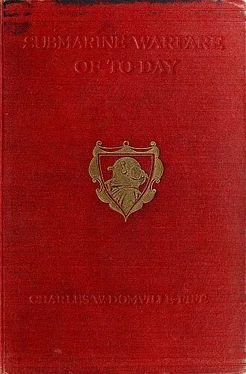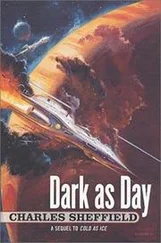These tripods were laid a distance apart and quite away from the bombarding ships, but a system of range-finding and signalling had been organised and an officer chosen as a “spotter” in each trestle.
The post of honour was on one or other of these observation towers, alone with the necessary instruments. The big shells from the shore batteries would scream overhead; some would plough up the water close by, smothering the tripod with spray, and the smaller guns would direct their fire against these eyes of the bombarding fleet. The chances were in favour of a hit, then there would be nothing left of the tripod or the spotter, simply a brief report to the Admiral Commanding that No. —— observation post had been destroyed and later a fresh name in the casualty lists. It was, however, accepted as the fortune of war, and many volunteered.
The sky brightened until a pale yellow glow suffused the east, while behind the bombarding fleet the western horizon was still a cold, hazy blue. A flight of seaplanes buzzed overhead and a few minutes later the dull reports of anti-aircraft guns echoed across the miles of still water. Tiny bright flashes from white puffs of smoke appeared in the central blue, and then having got the range the great guns of the monitors roared away their charges and the scream of shells filled the air. The calm of the morning vanished, and with it the oppressive silence which precedes a battle.
It was some time before the German airmen could rise from the ground and evade the British fighting formations. In the meantime a rain of heavy projectiles from the fleet was destroying all that was destroyable of the harbour and works of Zeebrugge. With the aid of glasses huge clouds of smoke and sand could be seen rising into the air almost every second. Objects discernible one minute had disappeared when the smoke cloud of bursting shells had moved to another point of concentration a short time later. When at last the enemy’s planes, in isolated ones and twos, succeeded in hovering over the fleet the surface of the sea was almost instantly broken by great spouts of white water, at first far away, then nearer, and the battle commenced in earnest.
A vast cloud of smoke now hung like a black curtain between the fleet and the shore. The M.L.’s were emitting their smoke screen to cover the bombarding ships. Shells splashed into the sea all around. The noise and vibration of the air seemed to bruise the senses, and lurid flashes came from the smoking monitors.
It was at this stage of the bombardment that the curious and unexpected happened. A white wave raced along the surface towards a monitor. It was too big for the wake of a torpedo and quite unlike the periscope of a submarine. The small, quick-firing guns of all the ships within range were trained on it and the sea around was ploughed up with shell. The white wave swerved to avoid the tornado of shot, but continued to make direct for the hull of the great floating fort at a considerable speed. Then, as it drew very near to its objective, a shell went home and the sea was rent by the force of a gigantic explosion, eclipsing that of any known weapon of sea warfare.
It was, however, soon discovered that the mysterious wave came from a fast torpedo-shaped boat which was evidently being controlled by electric impulses from a shore wireless station some twelve to fourteen miles distant, the necessary information regarding direction of attack being transmitted by means of wireless signals from a seaplane hovering overhead, the abnormal force of the explosion being due to the heavy charge of high explosive which such a craft was able to carry in her bow, so arranged as to fire on striking the object of attack.
With the failure of this ingenious but costly method of attack precautions were at once taken against a repetition and the seaplane hovering inconveniently overhead was driven off. The bombardment was carried on for the allotted span, by which time the shore batteries that still remained in action had found the range, notwithstanding the heavy smoke screen emitted by the M.L.’s. “Heavies” were ploughing up the water unpleasantly close to the monitors, one of which was struck, though but little damaged.
It was now considered time to draw off seawards, and the spotting officers, perched on their tripods, had to climb down the railway irons under a heavy fire and swim to the ships sent to rescue them. The tripods were then pulled over on to their sides by ropes attached to their summits and left lying in the shallow water.
Under cover of the smoke screen the bombarding fleet withdrew, after inflicting severe damage on the submarine base of Zeebrugge.
* * *
Some two weeks previous to this bombardment a warship patrolling off the Belgian coast had reported a curious explosion in the direction of Nieuport. The night was dark and the stillness of summer rested over the Pas-de-Calais. Waves lapped gently the distant sand-dunes and war seemed a thing far away, remote as the icy winds which blow around the Poles.
In the conning-tower and at the gun stations both officers and men watched keenly, silently, for the predatory Hun. At any moment the thin blackish-brown hulls of a raiding flotilla from the bases at Zeebrugge and Ostend might slide out of the blueness of the night. The beams of searchlights would momentarily cross and recross the intervening sea and then the guns would mingle their sharp reports with the groans of dying men.
To the nerve-racking duties of night patrol in the Straits of Dover they had grown accustomed—indifferent with the contempt born of familiarity—but this did not cause any relaxation of vigilance. The element of surprise is too important a factor in modern war to be treated lightly.
So it happened that when, shortly after eight bells in the middle watch, a momentary flash of lurid flame stabbed the darkness away over the Belgian coast, and was followed by the rumble of a great but distant explosion, no one stood on his head or lost his breath blowing up a patent waistcoat, but all remained at the “still.” Minutes passed and nothing happened. Slowly the destroyer crept closer inshore, but the night was dark and no further sound broke its stillness.
For two hours she scouted and listened. Little more than five miles away lay the German lines, and the theory was that somewhere in that maze of trenches and batteries an explosion had occurred.
Next day the mystery deepened, for it became known that a large portion of Nieuport Pier had been blown away during the night. As this little seaport was, however, inside the German lines, the mystery remained unexplained until after the bombardment of Zeebrugge, when it became known, in divers manner, that one of the electrically controlled boats had been out on a night manœuvre and, owing to the difficulties of seaplane observation in the dark, had accidentally struck the breakwater of Nieuport.
Many of the patrol boats guarding the Straits of Dover or minesweeping under the fire of German coast batteries off the Belgian sand-dunes spent their days or nights of rest (!) in the French seaport of Dunkirk, returning to Dover only after considerable periods of work on the opposite coast.
It may be thought that there was but little difference between life in the British port and that in the French town, considering the short stretch of sea between them. The following account of a night in Dunkirk will, however, give some idea of the advantage gained by having even thirty miles of blue water between an active enemy and a comfortable bed.
The night seemed uncannily quiet. In time of peace it would have passed unnoticed as just ideal summer weather, but when the human ear had grown accustomed to the almost perpetual thunder of the Flanders guns any cessation of the noise gave a feeling of disquietude, only to be likened to the hush of great forests before a tropical storm. The little town of Dunkirk, with its many ruins, was bathed in shadow, unrelieved by any artificial light, but the narrow, tortuous harbour showed a silvery streak in the brilliant moonrays. Above the sleeping town, with its Poilu sentries and English sailors, was the deep indigo sky, spangled with stars.
Читать дальше












